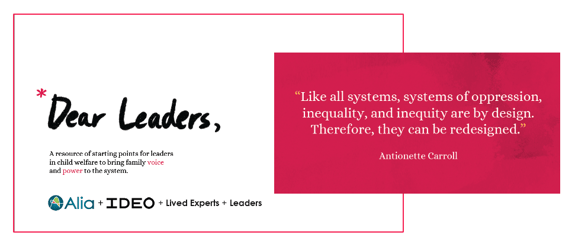It’s not Go, Set, Ready. It’s ready first.
The boost of support for co-designing new ways of work with impacted persons is such an incredible Bright Spot in child welfare. It indicates that, as a field, we are recognizing that we cannot (and should not) develop solutions to family challenges without involving families. As a collective, we are believing more deeply that “those closest to the problems are closest to the solutions” (Glen E. Martin) and identifying more equitable ways to bring together the voices of those most impacted with those who (currently) hold significant power and resources to fuel solutions.
 Co-designing in child welfare means bringing together impacted persons with systems representatives to build and resource solutions designed by families. Alia has been engaged in co-design in child welfare since 2017 when we hosted Ten of Ten for Kids with 100 impacted persons and innovators, and we’ve learned a great deal in our subsequent co-designed transformation projects since then in the development of Dear Leaders, in our work with the State of New Jersey, and currently in Wisconsin.
Co-designing in child welfare means bringing together impacted persons with systems representatives to build and resource solutions designed by families. Alia has been engaged in co-design in child welfare since 2017 when we hosted Ten of Ten for Kids with 100 impacted persons and innovators, and we’ve learned a great deal in our subsequent co-designed transformation projects since then in the development of Dear Leaders, in our work with the State of New Jersey, and currently in Wisconsin.
In no way have Alia and our partners figured this out, and we continue to make mistakes and acknowledge that our learning has caused harm. We are working every day to not repeat those harms, in small and big ways, and to help others to also learn from the teachings gifted to us from those who have not only been harmed by the system but re-harmed in working to put an end to the practices of family surveillance and separation. We are deeply committed to on-going reflection as we learn so that we adjust and share what we’ve learned.
The primary thing we’ve learned is that you can’t just leap into co-design (as excited as you might be to do so) without adequately building trust in families and in communities, supporting their vulnerability to return to the table to design solutions to the impact of harm placed upon them and their communities, and without supporting the trauma-reactivation of working along side those who have done you harm. This cannot happen without preparing the system to understand that history of harm, our role in that harm, and without learning to humble ourselves to families and communities to prevent further harm. We must be committed to the long, painful, and hard work of preparation, of learning and unlearning history, of trust building, and preparing ourselves to be able to acknowledge our mistakes and the harm they cause, and to be ready to say I’m sorry. It’s READY, set go. Get ready, so others don’t have to suffer when you aren’t—a lesson we continue to integrate and practice.
